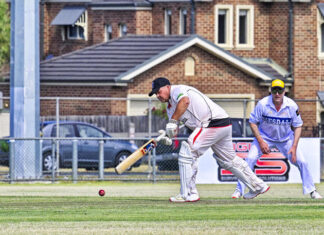Grovedale’s Glenda Ford was a fit, 55-year-old enjoying her first grandchild when a small, painless lump appeared in her throat.
But, the following months of radiation therapy, tube-feeding and life-threatening surgery to fight aggressive neck cancer changed the marketing executive’s life forever.
Glenda recounted her experience this week as Barwon Health prepared for World Head and Neck Cancer Day on Thursday.
“Eighteen days after surgery to remove the lump, I had a massive bleed requiring hospitalisation to cauterise it,” Glenda said.
“As I was going under, I was told I might not live through the operation, but thankfully I did.
“I had 35 rounds of radiation therapy simultaneously with chemotherapy over seven weeks.
“After the tonsil was removed, I had a PEG tube inserted into my stomach to allow me to have a high protein liquid food. It remained there for eight months.
“During this period, I was unable to eat solid foods for most of that time.”
The treatment was enough to endure, but Glenda said she and husband Geoff also encountered social stigma attached to head and neck cancers.
“People assume that if you have a head and neck cancer, you’ve been a heavy drinker and smoker,” she explained.
“But not all people who have a head and neck cancer have been drinkers or smokers, including myself.
“Without using the exact words, some people considered me and others with this type of cancer to have lived a dirty life.”
Glenda said she was in remission, but her treatment and recovery were ongoing.
“I’ve learnt to live around these limitations,” she said.
“I have a wonderful quality of life. I’m living and enjoying my life with friends and family and doing volunteer work.”
Now 63, Glenda volunteers at Barwon Health’s Supportive Care Centre with people encountering similar experiences.
She hosts morning tea twice a month for up to 30 patients and family members to support each other.
“This cancer is less well-known, and it can happen to anyone. It’s a terrible cancer that causes so much trauma with a long road to recovery,” Glenda said.
“I made a conscious decision to remember as much as I could about my experience, so I could help others going through similar experiences. Many people supported me during and after my illness.”
Glenda said the support included raising money for “bags of the essential things people need when they begin their treatment journey”.
Barwon Health had been providing the bags to newly diagnosed patients for the past five years, she said.
Barwon Health said head and neck cancer was a general term for a range of cancers in areas including the oral cavity, tongue, palate, jaw, salivary glands, throat, and nose.
Radiation oncologist Maitham Mathlum described head and neck cancer as complex but responsive to treatment.
“Early detection plays a big part in prognosis and educating the community and GPs about symptoms and signs of the disease is important,” Dr Mathlum said.
“Symptoms depend on the site. However, a person may experience one or more symptoms of pain, swelling, hoarse voice and difficulty swallowing.
Anyone with symptoms or concerns should consult a GP, he said.
About 4000 Australians were diagnosed with head and neck cancers annually, with Barwon Health treating 200 last year.
Lump leads to ‘fight of her life’

Digital Edition
Subscribe
Get an all ACCESS PASS to the News and your Digital Edition with an online subscription
Supersaints aim to shape final four
St Albans/Breakwater captain Damien Biemans is hoping his side can upset a few of the teams vying for GCA4 finals in the final three...








